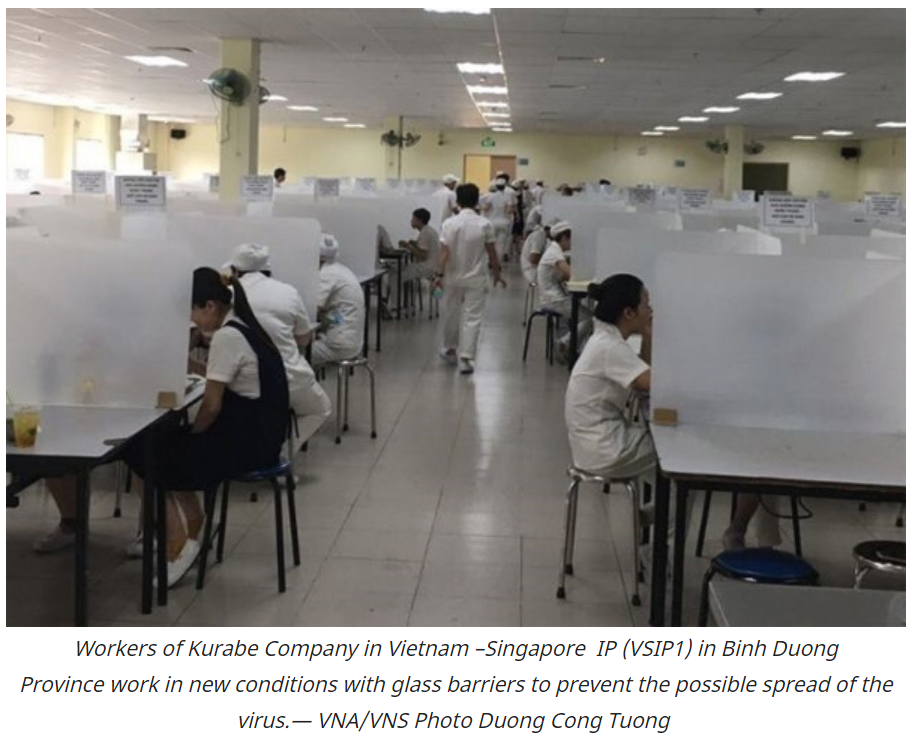Vietnam: Experts identify new trends in the development of IPs
The impacts of the COVID-19 pandemic have slowed down the operations of businesses in industrial parks (IP), disrupting supply chains and labour, according to a recent report by the Ministry of Planning and Investment (MPI).
Representatives of ministries, enterprises and foreign investors participated in the seminar ‘Identifying new trends in industrial park development’ on Monday to discuss, analyse and seek solutions to increase the operational efficiency of IPs for economic recovery and development after the pandemic.
Participants agreed it was necessary to recognise and re-evaluate the suitability and effectiveness of local IPs.
MPI said the implementation of social distancing to prevent COVID-19 led to the locking down of factories and restricted movement of workers in IPs. As a result, production stagnates, production costs increased, capacity fell and supply chains were disrupted, while many orders had to be moved to other locations.
According to the ministry’s representative, though social distancing was a temporary solution, “If this situation continues, it is likely that investors will shift production to other countries and affect the psychology of new investors.”
Vu Anh Tu, deputy director of the Department of Architecture Planning, Ministry of Construction, suggested that the Government should continue to review and complete additional policies and documents, as well as ensure the law meets the integration of IPs’ development planning with urban area development. At the same time, they should harmonise national plans associated with local economic development.
Tu said: “The next step is to review, complete and supplement legal regulations on investment and construction of industrial parks suitable for each type of production and each period. If there are barriers in the provisions on the Law on Investment and the Land Law, they must be adjusted and completed with criteria and standards on the scale and structure of land use for technical infrastructure in IPs.”
Ko Tea Yeon, General Director of Heesung Electronics Vietnam Company, said that in order to develop industrial parks, especially amid the changes due to COVID-19, “It is necessary to develop smart IPs,” adding “It is necessary to strongly develop an online system for meetings between members of the company.”
He said: “Another important issue is that officials and employees need to be more concerned about their health, and people need to be better equipped with the knowledge to take care of their own health. For an IP, there should be the construction of houses and dormitories for employees so that they can stay, ensuring health and safety is also ensuring the production safety of the company.”
He Hongsun, vice president of the South Korean chamber of commerce in Vietnam said there are factories in IPs without any housing policies for employees, while the development trend of IPs in other countries is mixed, even combining urban areas, houses, clinics and schools to serve officials and employees of the zone.
Therefore, he said the country should develop a new industrial model, not only building plants that come into service to allow employees to live and work, adding: “The management board of investment projects, local governments as well as IPs should study the matter, applying the model in developing countries for sustainable development, especially during preparations after the pandemic.”
At the seminar, experts, managers and businesses also discussed many issues such as assessing the current status of industrial zones in Vietnam in relation to investment needs.
They said at the same time, trends in industrial park development should be considered, especially the impact of the COVID-19 pandemic on development and policy solutions to improve the quality of industrial parks.
MPI said over the past 33 years, Vietnam has formed a system of IPs and economic zones that plays an important role in the foreign-invested economic system, adding that statistics showed every year, the amount of FDI invested in IPs and economic zones accounts for 60 and 70 per cent of the total amount of FDI attracted in the country. Accumulated to the end of June 2020, more than US$198 billion of domestic capital poured into industrial parks and economic zones.
According to the MPI, by the end of May 2021, the whole country had 394 IPs. The ministry also said land area used for the IPs only accounts for about 54 per cent of the total land area allocated to industrial parks at more than 95,000ha. Thus, there must also be over 43,000ha of vacant land for new investment projects so there will also be new industrial parks formed in the future, including new types of industrial parks.
Source: Vietnam News


 English
English




